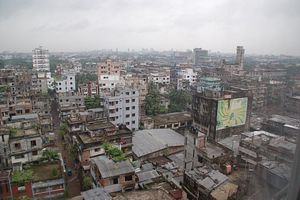Akramul Haque was invited by law enforcement officials to discuss some matters on May 26 and taken from his home situated in Teknaf, a sub-district of Cox’s Bazar in Bangladesh. Within a few hours his bullet-ridden body was found and police claimed the matter as an “encounter with a drug trader.” More than 10 others were killed that same night across the country.
Haque was an elected councilor of a city corporation. Later, Haque’s family called a press conference and demanded justice for his extrajudicial killing. The media grabbed attention with a recorded phone call which Ayesha Begum, Haque’s wife, claimed captured the last moments of her husband’s life; gunshots were also heard on the audio clip. She challenged the statement given by the law enforcement force and demanded justice.
At least 128 people have been killed since law-enforcement agencies began an anti-drug drive last month. The operation started after Prime Minister Sheikh Hasina called on law enforcement to press operations against narcotic traffickers. The deadly crackdown on the drug trade has drawn comparisons with President Rodrigo Duterte’s similarly violent purge in the Philippines.
But as the death toll rises, there are growing allegations the campaign is a cover for a wave of extrajudicial killings and political intimidation ahead of a general election later this year.
Security forces including police and the elite Rapid Action Battalion (RAB) have given similar statements regarding most of the deaths in the anti-drug drives, claiming that drug traffickers opened fire on them forcing law enforcement agents to retaliate. In some of the cases, they claimed to have found bodies following shootouts between two gangs of drug traffickers. However, no credible gunfight evidence has been shown yet, and no officers have been injured.
Human rights organizations have expressed their concern over the killings, raising questions about the authenticity of the police reports. The United Nations Office on Drugs and Crime (UNODC) said in a statement that they are “closely following” developments related to anti-drug operations in Bangladesh. The EU and a number of local intellectuals and rights group have expressed their concerns as well.
The UNODC’s statement read in part:
UNODC urges all Member States to adhere to their commitments to promote balanced, human rights-based approaches to drug control, in line with the three international drug control conventions and the outcome document of the United Nations General Assembly special session on the world drug problem.
We stand ready to engage with all countries to help bring criminals to justice with the appropriate legal safeguards, in line with international standards and norms, and to promote evidence-based prevention, treatment, rehabilitation and reintegration.
The European Union delegation in Dhaka called upon Bangladesh to investigate “fully” all deaths related to the anti-drug crackdown. In a statement, the delegation said “We expect the authorities to ensure that all incidents involving the deaths of alleged criminal suspects are investigated fully and in accordance with due processes.”
“In many shootout cases, Law-enforcing agencies’ members are not fully following the existing laws and regulations of the country,” Dr. M. Enamul Huq, former inspector general of police, reportedly said. He also added that the objective of the anti-narcotics drive is very good and praiseworthy but the process is “questionable.”
Ahmed Aazam Khan, an activist and opposition leader, blamed Awami League regime for worsening the country’s drug situation in its past decade in power. Drugs have spread like “an epidemic” he said. Khan also said “We have enough fear and questions about the timing of this anti-drug drive. The government has made a way out to suppress and intimidate the opposition workers through this drive.”
After massive criticism on social media, in the press and among the public, the government said it would investigate Akramul’s case. Nevertheless, Prime Minister Hasina in a press conference said that whoever is criticizing the anti-drig drive doesn’t want to eliminate drugs. Party Secretary Obaidul Quader added, after criticism came from the League’s main opposition, the Bangladesh Nationalist Party (BNP), that those who are involved in the drug trade within the BNP are being searched.
More than 17,000 suspected drug peddlers or abusers were arrested by the security forces across the country during the drive, according to local media.
Shakil Bin Mushtaq is a Bangladesh-born journalist and author.
































